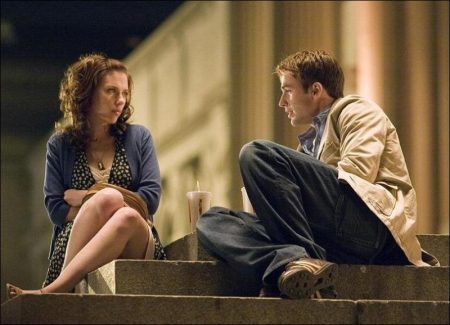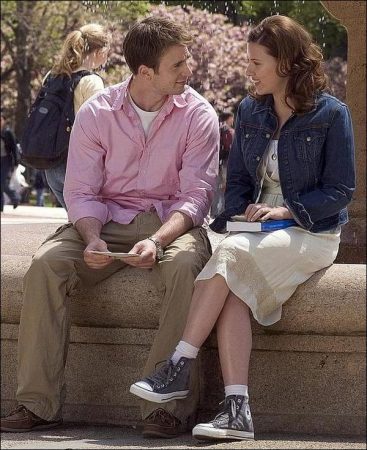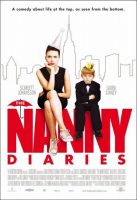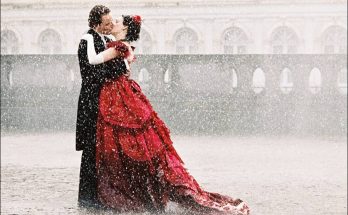Tagline: A comedy about life at the top, as seen from the bottom.
The Nanny Diaries tells the story of the emotional and often humorous journey of Annie Braddock (Johansson), a young woman from a working-class neighborhood in New Jersey, struggling to understand her place in the world. Fresh out of college, she gets tremendous pressure from her mother to find a respectable position in the business world although Annie would prefer to trade in her blackberry for an anthropologist’s field diary.
Through a serendipitous meeting, Annie ends up in the elite and ritualistic culture of Manhattan’s Upper East Side – as remote from Annie’s suburban New Jersey upbringing as life in an Amazon tribal village. Choosing to duck out of real life, Annie accepts the position as a nanny for a wealthy family, referred to as simply “the X’s.”
She quickly learns that life is not very rosy on the other side of the tax bracket, as she must cater to the every whim of Mrs. X (Linney) and her precocious son Grayer, while attempting to avoid the formidable Mr. X (Giamatti). Life becomes even more complicated when Annie falls for a gorgeous Park Avenue Hottie (Evans), and she’s forced to re-examine her life and the direction in which it is headed.
The Nanny Diaries is a 2007 American comedy-drama film, based on the novel of the same name by Emma McLaughlin and Nicola Kraus. Written and directed by Shari Springer Berman and Robert Pulcini, it stars Scarlett Johansson, Laura Linney, Paul Giamatti, Donna Murphy, Alicia Keys, Chris Evans, Judith Roberts, Nicholas Reese Art and Julie White; and was produced by Richard N. Gladstein.
About the Production
In 2002, the satirical novel “The Nanny Diaries” was published to critical acclaim, blockbuster sales, and a substantial degree of notoriety. The book’s controversy was inspired by the fact that its authors, Emma McLaughlin and Nicola Kraus, had spent a combined eight years working as babysitters in Manhattan, for over thirty families.
As their novel presented a scathing and hilarious portrayal of an astronomically affluent Park Avenue family, the media began whispering, “who’s-the-book-really-about?” While the authors insisted their book was fiction, it was written in such a knowing style that it practically invited this kind of speculation.
Months before the hoopla, the book’s film rights were purchased by Producer Richard N. Gladstein (Finding Neverland, The Cider House Rules) and his associate Gary Binkow, for Miramax. “It was just as good an idea when we first read it,” says Gladstein, “but it obviously puts a different responsibility on us as filmmakers once so many people have read the book—we have to get it right. But our intention all along was to make our own film.”
Gladstein had become friendly with screenwriter/directors Shari Springer Berman and Robert Pulcini when he met with them about a screenplay they had previously written. After seeing an advance screening of their acclaimed film, American Splendor, he approached them about writing the screenplay for The Nanny Diaries, and subsequently, to direct as well.
At first glance, it might seem surprising that Springer Berman and Pulcini would follow their portrayal of the humdrum life of Cleveland file clerk Harvey Pekar in American Splendor by exploring the high-flying upper crust of The Nanny Diaries. “We really liked that the setting was so drastically different,” says Pulcini. “It was very appealing to jump into a completely different world.”
“I’m a native New Yorker,” says Springer Berman, “and I could tell that the women who wrote the book were real New Yorkers—it wasn’t a fantasy from someone who lives someplace else. It was truthful, and a very interesting portrait of a subculture that I found fascinating.”
The novel also connected to a theme that the directors have been fascinated with throughout their career. “The book is about work,” says Springer Berman. “Harvey Pekar spends a lot of time talking about his boring job, and even our documentaries, like The Last Days of Chasen’s,” are about work environments. A nanny is a job that is often invisible; I felt we could tap into that.”
Springer Berman herself went through a period of her life very similar to the heroine of The Nanny Diaries. “Right after I graduated from college, I got a job working for a husband and wife screenwriting / producing team,” she says. “I worked out of their home and got totally entrenched in their lives. I wasn’t a nanny, but it was a very nanny-like situation. For me, it was a point in my life to duck out and not have to make any decisions. When I read the book, it appealed to me to write a script about a phase—which I think most young people go through— where they don’t know who they are yet.”
In keeping with Springer Berman’s personal connection to the story, the filmmakers made the main character, Annie Braddock, a recent graduate, rather than still a student, as in the book. A big challenge Springer Berman and Pulcini faced in translating the novel into a film was that much of the story was told through Annie’s inner thoughts. The filmmakers use some narration, but they also devised more cinematic strategies. As Annie is an observer at this point in her life, they made this more explicit by turning her into anthropology major. When Annie looks at various characters in the film—generally career women—she fantasizes seeing them in diorama cases in the Museum of Natural History.
“She steps outside herself,” says Pulcini, “and she becomes a hundred percent observer.” In the book, many of the characters — usually the moneyed ones—were given generic names like Mr. and Mrs. X, Harvard Hottie, etc. While this may have been because the authors wanted to keep their real subjects anonymous, Springer Berman and Pulcini retained them in the movie, which fit in well with Annie’s anthropological perspective. On the other hand, they changed the name of the main character—whose real name is “Nanny” in the book—to “Annie.” “We wanted her to lose her name and her identity when she went to work with the X’s,” says Springer Berman.
Springer Berman and Pulcini also tipped their hats to the most iconic nanny movie ever, “Mary Poppins,” with fantasy sequences of Annie grasping a bright red umbrella and floating over the Manhattan skyline. “We wanted to capture the whimsical feeling of “Mary Poppins” and “The Sound of Music,” but also to juxtapose that a little bit with the reality of New York,” says Pulcini. “We loved the idea of using the red umbrella as a symbol of her desire for freedom and escape from her life and her problems.”
Continue Reading and View the Theatrical Trailer
The Nanny Diaries (2007)
Directed by: Shari Springer Berman
Starring: Scarlett Johansson, Laura Linney, Paul Giamatti, Donna Murphy, Alicia Keys, Chris Evans, Judith Roberts, Nicholas Reese Art, Julie White
Screenplay by: Robert Pulcini
Production Design by: Mark Ricker
Cinematography by: Terry Stacey
Costume Design by: Michael Wilkinson
Art Direction by: Ben Barraud
Music by: Mark Suozzo
MPAA Rating: PG-13 for language.
Distributed by: Metro Goldwyn Mayer, The Weinstein Company
Release Date: September 7, 2007
Views: 110






